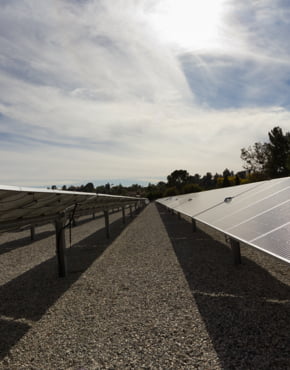Decline by 45% supported by Metropolitan’s $1 billion investments in conservation alongside region's commitment to sustainability
Southern Californians have reduced their per person potable water use by 45% since 1990, a decline driven by Metropolitan’s nearly $1 billion investment in conservation rebates and programs, along with the region’s commitment to embracing a conservation ethic.
The achievement was highlighted in a report chronicling Metropolitan’s investments in conservation and local water supplies submitted this week to the California Legislature. The 25th annual report also outlines the more than $750 million Metropolitan has invested in recycling, and groundwater recharge projects.
"More than three decades ago, Metropolitan and other Southern California water agencies made a commitment to increase water reliability in Southern California by helping residents and businesses become more water efficient and by investing in more local water supplies. The reduction in water use highlighted today is the culmination of those efforts, and a measure of the success when programs, people, and purpose come together,” Interim General Manager Deven Upadhyay said. “I want to thank Southern Californians for their efforts lowering their water use.”
The region used a record low 114 gallons per capita per day in 2023, down from 209 GPCD in 1990. In addition to long-term investments in water-efficiency, the reduction is thanks to conservation practices that continued from the last drought, along with the cool, wet winter that followed last year.
"California has always had great variability in how much rain and snow it gets from year to year; that variability is only going to become more extreme with climate change. By becoming more water efficient, we’re less stressed by the drought years,” board Chair Adán Ortega, Jr. said
Over the last 35 years, Metropolitan has helped the region reduce its water use through programs that promote long-term water-efficiency through incentives and education. For example, Metropolitan’s Turf Replacement Program provides a cash rebate for people who replace their thirsty lawns with more water-efficient landscapes. The program has incentivized the transformation of nearly 230 million square feet of thirsty lawns, saving enough water to serve about 82,000 homes annually. Metropolitan has also funded rebates for smart irrigation systems, high-efficiency toilets and washing machines, and new innovative technologies that could become the next generation of water-saving devices. These programs help build water-efficiency into homes and businesses, without relying on behavioral changes, Upadhyay said.
In March 2023, Metropolitan also launched a new tree rebate incentive as part of its Turf Replacement Program, offering a $100 rebate per tree planted to expand Southern California’s tree canopy. The district also continued its efforts to inform the region through its conservation advertising campaign and media opportunities, increasing awareness of Southern California’s water supply challenges and the need for increased water efficiency and investments in local water supplies to strengthen the region’s water resiliency.
“As we look back on the last 35 years of progress, we see more than just numbers. We see a collective commitment to stewardship, resilience, and innovation,” said Water Resource Management Interim Group Manager Brandon Goshi. “We are proud to showcase the success of Metropolitan’s investments, our member agencies’ innovations, and Southern Californian’s willingness to adopt mindful resource management.”
Along with conservation, Metropolitan has prioritized increasing local water supply and local storage, which have helped to decrease the region’s reliance on imported water even as the population in its six-county service area has increased. Metropolitan currently has a record 3.8 million acre-feet of water in reservoirs and groundwater banks.
Metropolitan continues to help ensure Southern California has a sustainable water supply with projects such Pure Water Southern California, which could become one of the world’s largest water recycling programs, and the High Desert Water Bank, a new investment in groundwater storage in the Antelope Valley.

The Metropolitan Water District of Southern California is a state-established cooperative that, along with its 26 cities and retail suppliers, provides water for 19 million people in six counties. The district imports water from the Colorado River and Northern California to supplement local supplies, and helps its members to develop increased water conservation, recycling, storage and other resource-management programs.
Media Contacts
